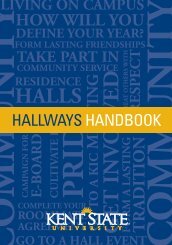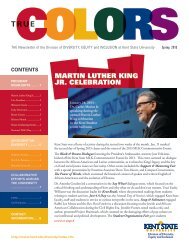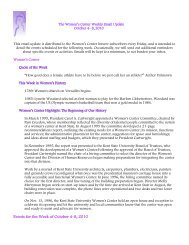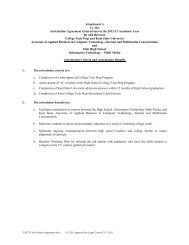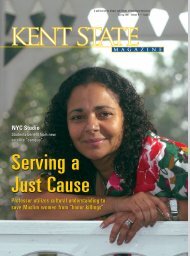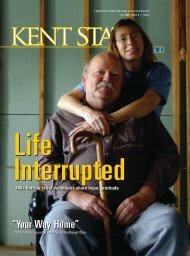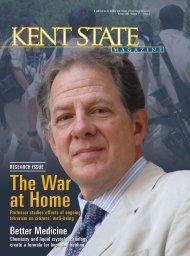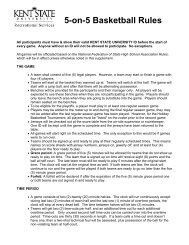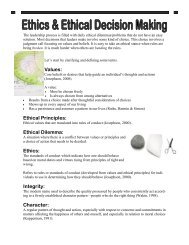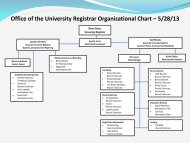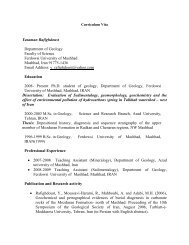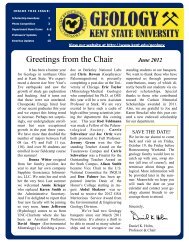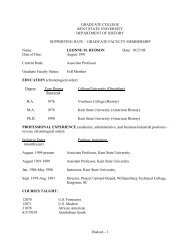E is for Education/Elephant - Kent State University
E is for Education/Elephant - Kent State University
E is for Education/Elephant - Kent State University
Create successful ePaper yourself
Turn your PDF publications into a flip-book with our unique Google optimized e-Paper software.
Photo by Gary Harwood, ’83<br />
You are 18 years old. Everyone thinks you have potential,<br />
but your high school grades weren’t great. (You were too<br />
bored with your homework to fin<strong>is</strong>h it.) On your first day of<br />
freshman Engl<strong>is</strong>h at <strong>Kent</strong> <strong>State</strong>, the professor begins writing<br />
on the board in what seems to be Hebrew. After a few minutes,<br />
he turns to the class and says, “Would any of you like to<br />
comment on th<strong>is</strong>?” What do you do?<br />
m Run <strong>for</strong> the door. It’s either the wrong class, or the<br />
guy <strong>is</strong> nuts. And what does that have to do with your<br />
computer science major anyway?<br />
m Sit still and hear the call of a million things you don’t<br />
know, from the mouth of a person who can teach you.<br />
Jim Rohrer, ’82, did stay<br />
in Dr. Lew Fried’s freshman<br />
colloquium, though there<br />
were times he knew he was<br />
in over h<strong>is</strong> head. He says by<br />
the end of the first semester,<br />
“Whatever bar Lew set, I<br />
was determined to reach it.”<br />
Because of that class and<br />
that teacher, Rohrer <strong>is</strong> now<br />
Dr. Lew Fried<br />
a college professor himself,<br />
with an outsider’s perspective on honors at <strong>Kent</strong> <strong>State</strong>.<br />
“College <strong>is</strong> purely utilitarian to so many people,” he<br />
acknowledges, “but honors <strong>is</strong> not vocational. It’s about learning to<br />
think and analyze. You don’t know where it’s going to take you.<br />
“Not every institution <strong>is</strong> willing to invest in creating space <strong>for</strong><br />
that. In a state university, it requires an unusual amount of commitment<br />
to create something that <strong>is</strong>, by nature, not <strong>for</strong> the masses.”<br />
Photo by Gary Harwood, ’83<br />
Next question:<br />
After college and a few years practicing your chosen profession,<br />
you realize that you’ve exhausted the possibilities of your<br />
culture, your job and your town (even though you already left<br />
<strong>Kent</strong> <strong>for</strong> a city on the West Coast known to be a mecca <strong>for</strong> cool<br />
people like you). It’s time to make a change. What do you do?<br />
m Stick to your career path. Seek a bigger salary or a<br />
more impressive title. At least move out of that tiny<br />
apartment and find a real house.<br />
m Make a new path. Take your skills to the people who<br />
need them, even it means you won’t be settling down<br />
<strong>for</strong> a long time.<br />
Journal<strong>is</strong>t L<strong>is</strong>a Schnellinger, ’80, moved to Seattle a few<br />
years after graduation to work <strong>for</strong> the Post-Intelligencer. And<br />
then, she says, “I just ran out of things to do.<br />
“I loved my Chinese h<strong>is</strong>tory and language courses at <strong>Kent</strong><br />
<strong>State</strong>, and the Post-Intelligencer had a relationship with China<br />
Daily. When they needed editors, I said, ‘I’m there.’”<br />
During the next 16 years, she trained journal<strong>is</strong>ts in 18<br />
countries, including Afghan<strong>is</strong>tan and many other places where<br />
she didn’t speak the language, or the country was at war,<br />
or the people didn’t exactly trust Americans. “When those<br />
opportunities came up,” she says, “I just kept taking them. It<br />
7<br />
was a way to bring together<br />
everything I loved — the<br />
highest ideals of journal<strong>is</strong>m.<br />
“The biggest thing the<br />
Honors College taught me<br />
was how to find smaller<br />
communities within the<br />
larger community. I get<br />
overwhelmed easily, but I’m<br />
really compelled to explore<br />
the world. You have to find<br />
ways to make yourself at<br />
home wherever you are.”<br />
L<strong>is</strong>a Schnellinger, ’80, and the<br />
Pajhwok Afghan News staff in<br />
Afghan<strong>is</strong>tan.<br />
For extra credit:<br />
You’ve earned a national reputation as an innovative<br />
manager, and you agree to lead a prom<strong>is</strong>ing start-up<br />
organization. All <strong>is</strong> going well until, on a beautiful spring day<br />
two years into your tenure, an unthinkable tragedy threatens<br />
the future of the enterpr<strong>is</strong>e. What do you do?<br />
m Lock it down. Expect the worst, and divert all<br />
resources to prepare <strong>for</strong> it.<br />
m Open it up. Hope <strong>for</strong> the best, and design an<br />
organization that can create it.<br />
Photo courtesy of L<strong>is</strong>a Schnellinger, ‘80<br />
Dr. Mike Lunine served as dean of the Honors College<br />
from 1968 to 1971, the years that bridged the wild expansion<br />
of the baby boom and the agonized contraction following the<br />
events surrounding May 4, 1970. The tower he helped to build<br />
on that bridge was tall enough to look <strong>for</strong>ward, but it was not<br />
made of ivory.<br />
“May 4 gave me a bit of a plat<strong>for</strong>m in the national honors<br />
community,” he says, “and I advocated dropping the emphas<strong>is</strong><br />
on IQ in favor of HQ — humanity quotient. At <strong>Kent</strong> <strong>State</strong>, we<br />
tried to enlarge the notion of what a so-called honors student<br />
<strong>is</strong>. An honors program should enable people called ‘students’ and<br />
people called ‘professors’ to work together to confront very large<br />
questions. What would be a good society? How do war and race<br />
and poverty affect that? All people have the capability to think<br />
about these questions, and all people need to think about them.”<br />
The honors response to those large questions, and even<br />
to the small questions posed here, <strong>is</strong> not always the easy or<br />
safe response. If there’s one thing that honors people have in<br />
common, it’s the ability to r<strong>is</strong>e to a challenge, and perhaps to<br />
find a challenge when there’s none in the immediate vicinity.<br />
Lunine saw the Honors College as a place where everyone<br />
involved could do a lot of “self-designing.” It’s a liberal concept,<br />
impractically interd<strong>is</strong>ciplinary, possibly elit<strong>is</strong>t and costly to<br />
maintain. But the 75 years of economic and social flux that<br />
provide context <strong>for</strong> <strong>Kent</strong> <strong>State</strong>’s honors experiment suggest that<br />
the well-designed self may be the most durable product of all.<br />
“Honors,” Lunine still ins<strong>is</strong>ts, “<strong>is</strong> about per<strong>for</strong>mance. What<br />
matters <strong>is</strong> not how you came in, but how you look when you<br />
come out.”<br />
Read more about honors people making a difference in the world,<br />
as well as plans <strong>for</strong> the Honors College’s 75th anniversary, at<br />
www.kent.edu/magazine.<br />
K e n t S t a t e U n i v e r s i t y K e n t S t a t e U n i v e r s i t y K e n t S t a t e U n i v e r s i t y K e n t S t a t e U n i v e r s i t y K e n t S t a t e U n i v e r s i t y K e n t S t a t e U n i v e r s i t y K e n t S t a t e U n i v e r s i t y K e n t



